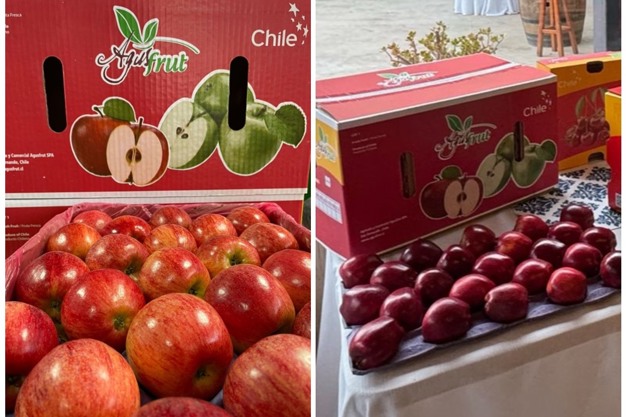The demand for Chilean cherries has been growing steadily in the Asian market, especially in China. According to Manuel Morales, CEO and founder of Agusfrut, Chilean cherries are considered a premium product, not only for their taste and shelf life, but also for the fruit's symbolic value in Chinese culture as a token of friendship and appreciation. Morales says that the demand has been increasing at a steady pace, with prospects of further growth as the Asian economy continues to expand.

"Chile supplies more than 90% of the cherries that go to China," says Morales, underlining the country's key role in this market. He also mentions that other countries, such as New Zealand and Spain, have increasingly greater productions, but they have not yet reached Chile's volumes.
Some of Agusfrut's most exported cherry varieties are the Santina, Bing and Lapins, which are in demand in Asia. The company also exports the apple varieties Gala, Granny Smith, Red Delicious and Fuji (although in smaller volumes), for which there is a good demand in Latin America.
China is still the main destination for Chilean cherries, although Korea is emerging as a key market for Agusfrut. For apples, some of the main markets are Colombia, Brazil, Venezuela, Peru and other Central American countries.

"In 2023, the production was affected by rain and warm temperatures in spring. This led to a drastic reduction in the yields of the Santina variety, with some hectares producing just 2,000 kilos, compared to the expected 15,000 to 18,000 kilos. In 2024, the weather conditions have been more favorable, so the production is expected to increase considerably," says Manuel Morales.
This year, the company is planning to export 30 containers of cherries, twice as much as the 15 exported last year. For apples, Agusfrut expects to increase from 24 to 70 containers. On a national level, Chile aims to export 115 million boxes of cherries and consolidate its position as one of the world's largest suppliers of this fruit.
Agusfrut resorts to both air and sea freight for its exports. "Air freight is used at the beginning of the season to take advantage of the higher prices then, as those are the first shipments to arrive to China. Later, as the volumes increase, sea freight, which is cheaper, becomes the preferred option. Sea transit times from Chile to China have improved considerably, with an average of 22 to 24 days, thanks to the Cherry Express ships, in contrast to the 35 to 40 days of traditional shipments. This speed ensures that the fruit arrives in optimal condition," says Morales.
The CEO says that this year's weather conditions have been ideal for cherry production. "This year, thanks to the low temperatures in winter, we are expecting optimum quality fruit, which should translate into better returns in the market."

To guarantee the quality of the fruit, Agusfrut has implemented a constant monitoring system that growers have in place from the beginning of the season until the harvest. It applies phytosanitary treatments at key moments in the production cycle, thus mitigating the adverse effects of the weather and guaranteeing a quality product. Moreover, the company complies with international standards such as GlobalG.A.P., an essential requirement to export to demanding markets.
For more information:
Agusfrut
Chile
Manuel Morales
Tel.: +569 92494438
[email protected]
www.agusfrut.cl
